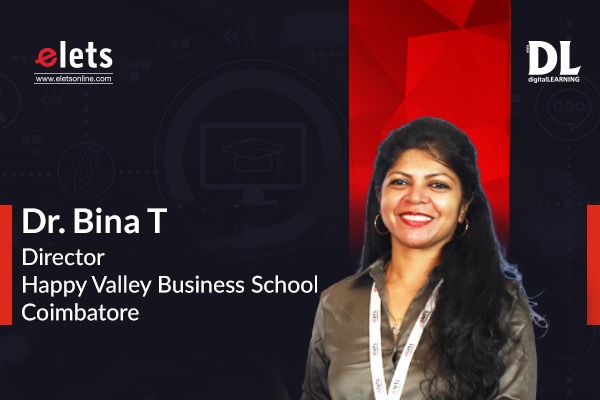
Today, innovation in education is all about technology. The landscape of education has come a long way since technology knocked the doors of the education sector. We are talking of virtual labs, classes in Metaverse, learning with Extended Reality, and much more. The entire ecosystem is pacing fast to evolve and make best use of technology to learn and teach. To explore innovation in education, Dr. Bina T, Director, Happy Valley Business School, Coimbatore interacted with Sheeba Chauhan of Elets News Network. Edited excerpts:
What is your vision for innovation in education?
An educational system that would permit students to be tested on their competencies and understanding of their subjects would be an innovation by itself.
Teaching, learning, and application at work should have a forward-backward linkage. Strong industry institutes connect where a student could learn deeply about one area would throw open possibilities for innovation in that area. Strongly believe that innovation comes out of interest!
What are the steps you are taking for your institutions to bring innovation?
Within the framework and regulation of the university that we operate in, our institution has always strived to have innovation in teaching pedagogy. Learning has never been restricted to the classroom. Innovation is a spark that is ignited when students meet the unexpected. We have student clubs that initiate new business simulation games and events. They engage with industry leaders which results in the cross-pollination of ideas. The Entrepreneurship Club has an Idea Lab which has students who sit together and dissect an idea to better it.
What can be the best technology to surpass innovation in the field of education?
Artificial intelligence has invaded every area and education cannot escape from it. It has already started demonstrating its use as a teacher, which understands the requirements of a student and does not rest until and unless the student is fully convinced of the content being taught.
A social virtual reality space, where a student can learn anything anywhere, not in isolation but with the feel of being in a face-to-face environment with peers would save unnecessary costs on infrastructure which again burdens the student indirectly through high fees.
NEP, experiential learning and a new paradigm of education is talk of the town. According to you, what are the perils and promises of NEP and the paradigm shift?
Though anything new promises reforms, challenges remain. Policies are great on paper, but implementation is never smooth due to the many formats of education. Change in mindset of not only teachers and management, but at the university level should first be attempted. Students have always misunderstood words like Failure, School drop-outs etc and the fear is would the same happen with NEP too?
Challenges in infrastructure, human resources (aka teachers), budgeting for the future, and strategic plans for the institution are a few which require answers.
The same governing body which has allowed the birth of institutions should also help in sustaining the same. If more institutions shut down, the huge infrastructure which was once demanded cannot be put to any alternative use.
Big fish eating small fishes would then happen in education, too.
What are the segments of the education landscape that still need revision?
Revision is required in every segment. The key segments in education are Students, institutions, and teachers.
Consumers (students) should have a change in mindset about the education system and what education should do for them. This should start right from school and learning to achieve a parents dream should not be the motive. Students should at a young age be made to independently think for themselves without the force of parents, teachers or friends.
Affordable education could happen only with resources from the government. In the absence of which, private institutions that struggle to do the best for their students should be allowed more freedom and autonomy. Faculty members should be treated with more dignity and the fear of job security be removed. Instead, it should be replaced by programs which train them to be better teachers.
Harassment in the form of ratings, rankings and accreditations should be done away with. The admissions/ strength of students in an institution is itself a rating accorded by the main stakeholder- the students, and should be accepted.
Do you think digital disruption in the education space will bridge the employment gap between colleges and cubicles?
Any new technology is only as good as its usage. If put to the right use definitely it would bridge the distance between the classroom and the boardroom.
Digital disruption has ‘taken away boring classes, long lectures and bias in marking. The technology could help in adaptive teaching making it very personalised for the student ensuring complete understanding of the content, real-time feedback, and assessment too. Such learning could also ensure better subject retention and hence the probability of better application in their workspace.
Since the students are digital natives, adaptation would not be difficult.






















